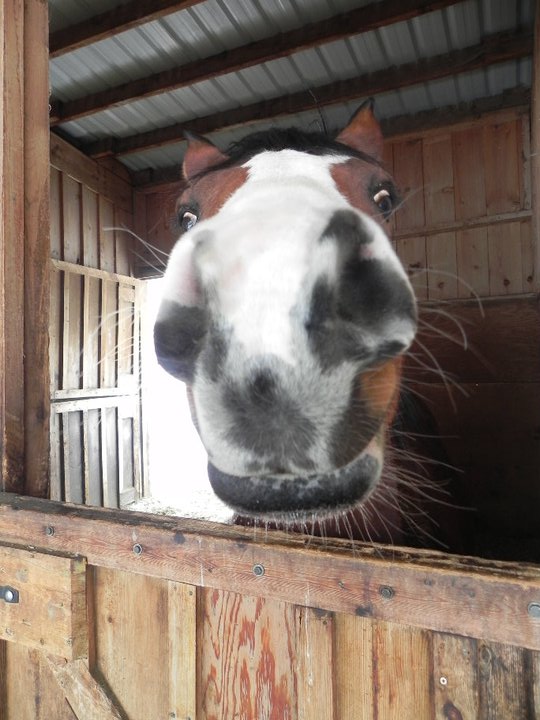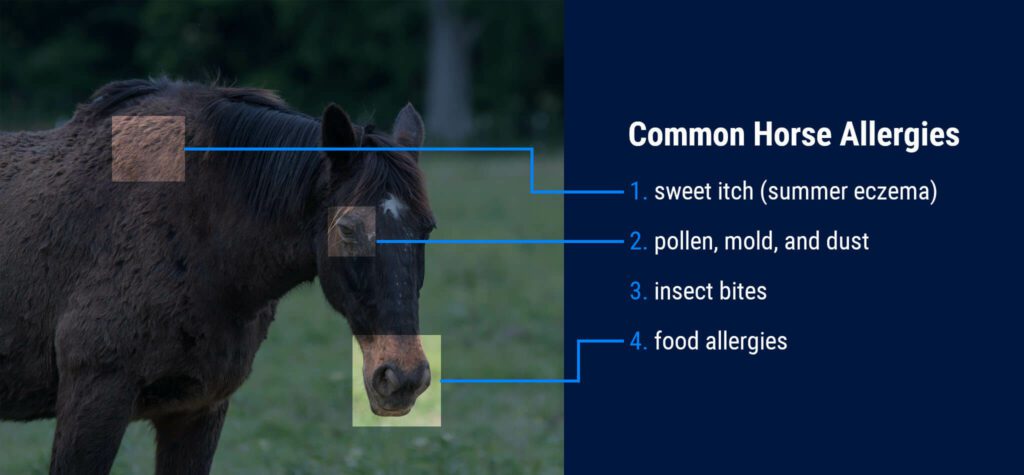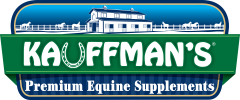Common Horse Allergies

Common horse allergy symptoms include hives, pruritis (itchy skin), respiratory problems such as coughing or wheezing and constant headshaking. Hives may start as small bumps on the skin but enlarge quickly to become raised welts. Horses suffering severe allergic reactions may be prone to anaphylaxis, which causes a sudden drop in blood pressure and breathing difficulties. Anaphylaxis requires emergency treatment for horse allergies in the form of epinephrine injections to prevent the horse from going into shock.

Sweet Itch (Summer Eczema)
Horses allergic to the bite of Culicoides midges may develop a rash on their necks, bellies and docks that oozes and crusts over. Intensely itchy, summer eczema forces allergic horses to rub, scratch and bite at their skin incessantly. Untreated sweet itch may encourage secondary bacterial infections and systemic illnesses.
Pollen, Mold and Dust
Equine allergies affecting the respiratory system present symptoms of labored breathing, excessive nasal drainage, runny eyes and headshaking. Horses with food or insect bite allergies are more prone to having airborne allergies than horses without allergies. An allergy-based condition called “heaves” can also be triggered by pollen. Affecting mostly older horses, heaves arises when lung cells react to allergens by swelling and thickening air passage linings and increasing mucus secretions. If thickened airways trap enough bacteria, the horse could develop pneumonia or other respiratory infections.
Insect Bites
In addition to midges, allergies in horses may also involve horsefly, mosquito, blackfly and deer fly bites. Fleas and mites can trigger allergic reactions as well. Symptoms of possible insect bite allergies include scabs, hairless patches, itching and inflamed skin predominantly affecting the base of the tail, belly, face and root of the mane.
Food Allergies
Although equine food allergies are uncommon, they do occur and typically involve grains, grasses or additives found in food supplements or processed feeds. The main symptoms of food allergies in horses are hives that may or may not itch and atopic dermatitis. Equine food allergies may also cause runny or bleeding noses, diarrhea or swelling around the belly and shoulders.
Treatments for Horse Allergies
When mold and dust are ruled out as allergens, a veterinarian may perform allergy tests by shaving off a patch of the horse’s hair and exposing the skin to different allergens presenting in grid patterns. Antihistamines are often the first choice of treatment, followed by removing allergens from the horse’s environment.
Since allergies emerge from compromised or improperly functioning immune systems, providing horses with immune support supplements may help reduce or even eliminate allergies in horses. Kauffman’s Animal Health offers natural immune supplements rich in vitamin and minerals to support immune system function.
One of the leading animal nutrition supplement companies in the U.S., Kauffman’s Animal Health uses only the highest quality ingredients in making equine, canine, bovine and llama/alpaca health supplements. If you have questions about allergies in horses or would like to know more about our nutritional supplements, please call 717-274-3676 or 1-800-992-3147.
page updated 2/22/18
